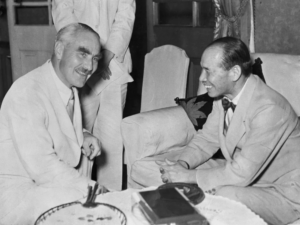“You took some of my freedom away, Mr. Elliot, that I am afraid to go out by myself, or afraid of riding the subway, afraid of being around people,” Vilma Kari recounted telling her attacker.
A 68-year-old anti-Asian hate crime victim described the momentshe faced her attacker this week, three years after he brutally assaulted her in New York City’s Times Square.
The victim, Vilma Kari, attended the sentencing of 41-year-old Brandon Elliot to read her victim impact statement, marking the first time she’s confronted the assailant since the attack. Elliot had crossed paths with Kari on the sidewalk in 2021, when he shouted expletives and told her “You don’t belong here,” before toppling her and stomping on her head and body repeatedly. He was sentenced to 15 years in state prison after he pleaded guilty to one count of assault in the first degree as a hate crime, and one count of criminal possession of a weapon in the third degree.
While the prospect of facing Elliot was nerve-wracking, Kari told NBC News she insisted on showing up at court so she could find closure and describe the impact the attack had had on her.
“You took some of my freedom away, Mr. Elliot, that I am afraid to go out by myself, or afraid of riding the subway, afraid of being around people,” Kari said, recounting her statements in court. “I really would like to emphasize that fear that he had instilled in my heart and the realization that after so many years of living here in America, that I am, or I was perceived as, not belonging here.”
Elliot’s attorney, Jamie Niskanen-Singer, said in a statement shared with NBC News that his client had “expressed remorse” for what Kari had gone through.
“Mr. Elliot has long suffered from serious and well-documented mental health diagnoses, which was a contributing factor but by no means a blanket excuse. He has accepted responsibility for his actions and sought to spare Ms. Kari of having to relive the ordeal at a trial,” Niskanen-Singer said in the statement. “While nothing can undo what Ms. Kari has gone through and continues to go through, we both hope that this sentencing and the opportunity to give her victim impact statement, which was both profound and eloquent, helps provide a measure of closure to her.”
The attack by Elliot, who had been on lifetime parole for murdering his mother in 2002 after serving 17 years in prison, has altered the lives of Kari and her family. Not only was she diagnosed with a fractured pelvis, forehead contusions and contusions across her body, she also faced mental distress from both the attack and the onslaught of media attention that followed.
Kari said that toward the end of the sentencing, Elliot spoke, apologizing for his behavior.
“I was so surprised when he spoke in court and said he was sorry for what he did to me,” she said. “I don’t know if some of the words that I told him — when I mentioned to him, ‘Mr. Elliot, I prayed for you’; I said also, ‘My faith has taught me the power of mercy and love and I just hope that you will truly reform’ — I don’t know if he was touched by those words, or the three-year incarceration after my incident has made him reflect on what he did to me, and he was really sorry.”
Kari said that although she was initially apprehensive about seeing Elliot again, having spent years fearful for her safety when alone in public, those emotions quickly dissipated.
“I would say I wasn’t really afraid of him anymore,” Kari said. “I just looked at him, feeling sorry for him.”
Kari’s daughter, Elizabeth Kari, who cared for her as she recovered, explained that her family has mixed feelings about the sentencing, but hoped that Elliot receives mental health treatment while incarcerated.
“Our wish to the court was — this is a person who’s been in the system, got out, and less than two years later, it happens again. Clearly the system has failed him in some way. And he hasn’t received the proper tools to deal with his mental health issues. So we’re hoping that this time around, he will have access to that,” Elizabeth Kari said.
For a while, Kari had been hesitant to speak out about the attack out of shame. It’s a feeling, experts say, that many Asian American victims contend with, which also prevents them from opening up about their experiences. But today, Kari said she feels differently.
“I don’t carry the shame anymore. I have outgrown that. What I’m feeling now is to be an advocate,” Kari said. “I was thankful that I survived. That I’m a survivor. And I am thinking, maybe it’s time to use my voice.”




